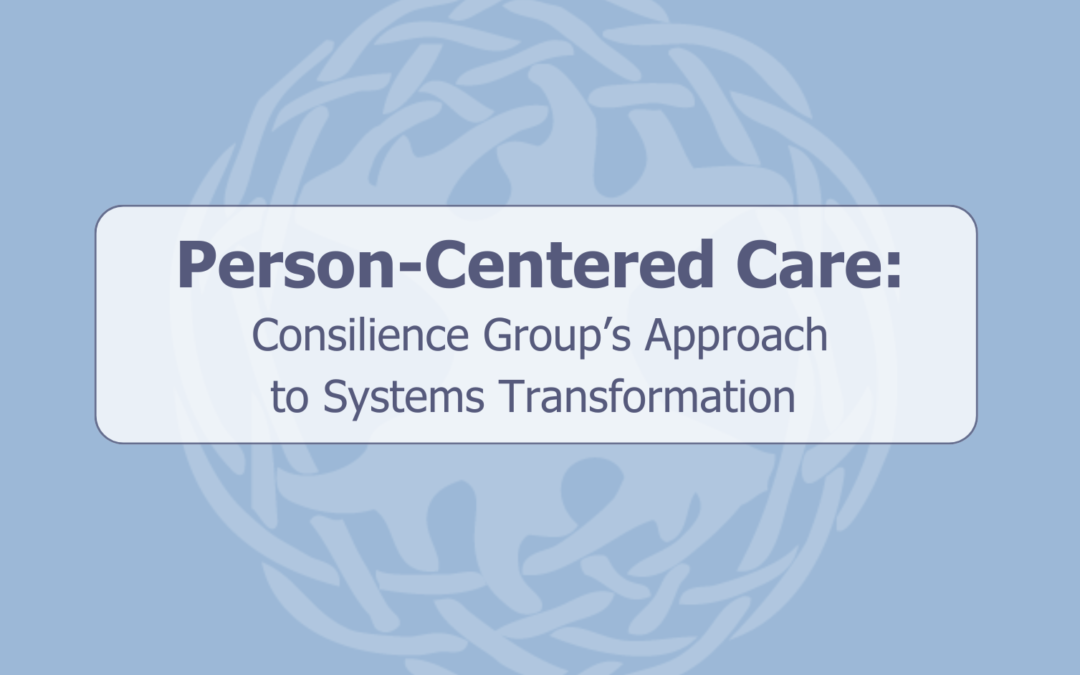What is person-centered care?
At Consilience Group, person-centered care is the core philosophy driving our approach to health and human services. We understand that people’s needs don’t fit neatly into one service category. Instead, addressing complex challenges requires working across multiple service domains and systems to ensure that care is holistic, integrated, and centered on the individual.
The concept of “consilience”—finding common ground among diverse entities—is at the heart of our methodology. This philosophy enables us to bring together organizations, stakeholders, and communities from varied sectors to co-create shared visions, set clear goals, and develop operational roadmaps for delivering person-centered care.
What does person-centered service look like in practice?
For Consilience Group, person-centered transformations look like working closely with local health departments, nonprofits, and other organizations to align services around the needs of the people they serve. We recognize that health is not just about medical care—it’s about addressing the social determinants that influence a person’s well-being, such as housing, employment, and education. That’s why we collaborate with diverse partners to integrate services, ensuring that individuals receive comprehensive, coordinated care across all aspects of their lives.
In our work with local and state organizations, we facilitate collaboration between healthcare providers, social service agencies, and community organizations to build integrated care networks. By leveraging consilience, we help these groups develop unified strategies that break down silos and enable seamless care transitions for individuals, especially those in underserved or marginalized communities.
Take our work with Southern Nevada Systems of Care Initiative as an example. The idea behind the system of care approach is simple: rather than sending someone from one service to another—whether it’s healthcare, housing, or financial assistance— people will be met with a single, coordinated system. So, instead of being told, “You’re in the wrong place,” they’ll get help no matter which door they walk through.
Here is a common system-centered scenario: a diabetic patient sees a doctor for medication but has to find their own nutritionist and struggles to manage multiple appointments without coordination, making it harder to follow through on the care plan. The system is rigid, expecting the patient to fit into a predefined process without considering the patient’s ability to juggle multiple providers.
Person-Centered Care in Practice
In a person-centered environment, a patient may have a care coordinator who helps them navigate various healthcare providers, ensuring their medical, emotional, and social needs are met. Allowing for their care to be personalized based on the patient’s health conditions, lifestyle, and preferences. Let’s consider the diabetic patient example. With a person-centered care model, they can receive not only medical treatment but also nutritional counseling, transportation assistance to medical appointments, and regular check-ins to ensure they are being supported during the process, reducing friction for everyone.
Person-centered care requires a deep commitment to empowering the people who rely on these services. At Consilience Group, we believe that those most affected by systems should have a voice in shaping them. Our participatory approach ensures that communities are involved in decision-making, so the systems we help design reflect their real-world needs and challenges.
Why Choose Person-Centered Care
In today’s rapidly changing world, person-centered care is more important than ever. But it is not easy to achieve and it requires careful alignment from experienced professionals to shift system-centered service models to person-centered. That is where Consilience Group comes in. By working within and across multiple service domains, we aim to create lasting solutions that serve people, not systems.
At Consilience Group, we’re proud to lead this transformation through collaboration, innovation, and a steadfast commitment to the individuals and communities at the heart of our work.
If you want to foster and build out person-centered services with your organization, contact us.

